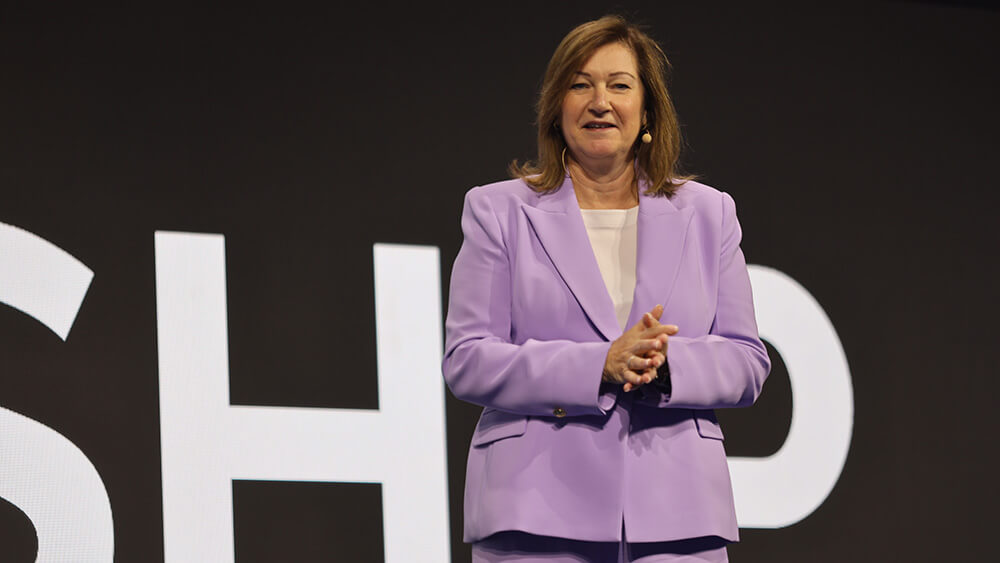
An initiative to significantly increase the number of females in the highest roles of the business events industry “is our moonshot,” said Lyn Lewis-Smith, CEO of BESydney. (Whatever Media Group)
Although women make up approximately 70 percent of the global business event workforce, they are underrepresented in top-tier management positions, according to a research report, Advancing Women in Business Events, released jointly by the PCMA Foundation and Business Events Sydney (BESydney) on Monday at Convening Leaders 2024 in San Diego.
Women leaders are not only underrepresented relative to their numbers in the business events industry, but they also lag behind the average number of women represented in senior leadership roles, according to the report. The research project was launched not only to understand why the gap is so pronounced in the business events industry, but to identify and engage the business events community in “specific and meaningful actions that will advance women into senior leadership roles — specifically C-suite and board roles — within the business events industry,” the report said.
The initiative to significantly increase the number of females in the highest roles of the business events industry “is our moonshot,” said Lyn Lewis-Smith, CEO of BESydney, at the launch of the report on Monday. During Monday’s session, “Unlocking Potential: Strategies for Advancing Women Into Business Event Leadership Roles,” Lewis-Smith noted that only 20 percent of upper-echelon roles in the industry are filled by women. “We need a coalition to be a champion of change,” she said.
The project research was conducted through a series of global in-person and online think tanks with the participation of male and female executives; one-on-one interviews with female business events executives; and a global DEI survey conducted in November in conjunction with the consulting firm PwC. The report released on Monday included research findings on the gender gap in leadership roles in the business events industry; the challenges to the advancement of women in the industry; and the availability of career support to women in the business events industry.
Barriers to Advancement
The research project identified consistent personal, organizational, and societal challenges in advancing women globally into leadership roles within the business events industry including: achieving pay equity; the need for flexibility in work hours as women typically bear a double burden of work and family care; lack of opportunities for career progression; a shortage of diverse talent on leadership teams; lack of support for learning and growth, skill development, and mentoring; gender biases inhibiting women from advancing into leadership positions; and different forms of discrimination, including gender discrimination carried out by management, colleagues, and customers/members. “The [business events industry] has the opportunity to be bold,” the report said, and address the challenges at all three levels.
The research project also found that career support and development opportunities for women are limited in the business events industry. When respondents to the PwC survey were asked if they felt they had the support of their organizations to advance their careers, nearly 60 percent of respondents felt leadership roles at their organization were not available to them, or if they were, that they did not have clear steps on how to advance into them.
One of the biggest gaps identified in the survey, the report said, was the lack of mentoring and sponsorship options available to survey respondents. Less than one-third of respondents said there are opportunities for formal networking provided by their organizations, and only six percent said that they have access to formal sponsorshop programs. In yesterday’s session, Kati Quigley, vice president, portfolio and customer marketing, Smartsheet, differentiated between the two: Sponsors will give you “hard feedback” she said. They will vouch for you and give you more critical feedback than a mentor might. She added: “Sponsors are determined to help you succeed.”
“One thing that is really clear [from the research] was the mentoring and the professional development that’s not happening — and it’s a huge opportunity for us as a global industry,” Lewis-Smith said.
What’s Next?
Part II of the research report, which will be released later in the first quarter of 2024, will present recommendations for actions that companies and individuals can implement to address the challenges outlined in the report released Monday. It also will present evidence for why women are ideally suited for leadership roles and why their leadership attributes and skills are critical to success of the business events industry of the future, the report said.
Sign up for a download of your FREE copy of The Advancing Women in the Business Events Industry Study: Part I
Related Reading
- Check out the Convene series interviewing women leaders at convention centers.
- Making Flexible Work Pay Off for Women
